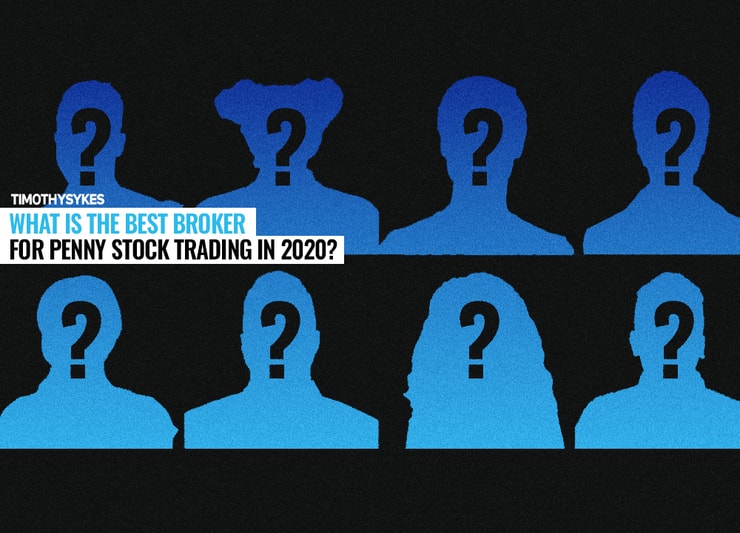I get this question a lot: What’s the best broker to trade penny stocks?
If you think you have what it takes to trade penny stocks in 2020, the first step is the same for everyone … Build your knowledge account.
You also need to find a broker that fits your trading style.
Back in the day, traders like me had few options when it came to brokers. No one would tell you how to find the best broker for penny stocks. And every time you wanted to make a trade, you had to do it by phone. It sucked!
In 2020, things are much different. There are TONS of options. You can make trades from home or virtually anywhere in the world with the click of a button.
Be grateful there are so many brokers available now. You have more options and it can be easier to find one that works best for you.
Penny stocks can be a great option for growing a small account. But your broker matters. So finding the best broker for penny stocks will mostly depend on how you trade. Let’s look at what you should consider.
Table of Contents
What You Should Look for in a Broker to Trade Penny Stocks?

There’s a lot to consider when choosing the best broker penny stocks — like your trading style.
So ask yourself…
Do you want to go long, short, or a combo of both? Will you focus on listed or OTC stocks? How much money do you have to start? Do you want the option to paper trade to practice setups? What will your trading schedule look like?
Your goal should be to find a broker that balances reasonable commissions and fees but also offers key tools and quality charts. But don’t choose a broker based on only one factor.
If you choose a broker just because it has pretty charts — you could notice commissions and fees start to add up over time.
And if you choose a broker based on commission-free penny stock trades, you may end up wasting time on a platform that doesn’t have the best tools for your needs.
Certain brokers can help or hinder your progress depending on where you are as a trader. It’s important to keep all these questions in mind as you research the one that will suit your needs.
Before We Begin
It’s worth mentioning just how useful the StocksToTrade platform can be for beginners learning to trade penny stocks. Yes, I helped design this platform, and I’m an investor in it. That’s why I LOVE it. It’s designed for the penny stocks I trade. I think its charts are the best.
StocksToTrade can help take the stress out of learning the basics. You can dive into a data-driven environment with real-time market information at your fingertips. It all helps you prepare to nail the right setup at the right moment.
StocksToTrade is not a broker, but it does include broker integration.
And its Breaking News Chat is a game-changer. You’ll also find the most useful paper trading feature on the market, which is smart for testing any new strategy.
After a few months of paper trading, StocksToTrade offers you the ability to link to your broker of choice. By doing this, you won’t have to ditch its beautiful charts or easy-to-use tools.
5 Best Brokers for Penny Stocks

Now, let’s look at some of the ‘best’ brokers for penny stocks and see how they stack up. First, let me say that the use of the word ‘best’ is subjective. What’s best for one trader may not work for another.
Do the work to find the best broker for your needs. The following is a breakdown of a few options.
Charles Schwab
Pros
For Schwab, there’s only a $1,000 minimum deposit required to open an account. That’s good if you’re a beginner with a small account trying to learn. This can be a common amount for new traders to start with.
Schwab offers commission-free trading on penny stocks and ETFs. As of 2019, it also offers commission-free trading on OTC stocks — aka pink sheets.
This can be a competitive perk for traders. Some commissions may seem small, but they add up quickly over time.
Also, Charles Schwab offers great research in real time. On top of the custom filters available, users can also view a variety of buy, sell, and hold recommendations. You can also find commentary and analysis on stocks from some of the country’s top firms.
Cons
If you’re considering mutual funds, Schwab may not be the broker for you. At $49.95 per buy, these fees are among the highest and can add up quickly. But if you’re looking for the best broker for penny stocks, you may not care about this.
Also, Schwab also has high margin interest rates. The rate sits just below 10%, which is fairly steep. But keep in mind it’s only on borrowed cash. I never trade on margin. And I don’t think new traders should either. The risks are just too big.
Looking for a promotion deal? Look elsewhere. Schwab promotions start with a $100K deposit. And in the case of almost all new traders, your first deposit probably won’t be that much.
New to trading penny stocks? Get my free online guide here.
More Breaking News
- Toyota’s Strategic Moves: A Comprehensive Analysis of Latest Developments
- D-Wave Quantum’s (QBTS) Surge: Unveiling the Mystery Behind Its Recent Stock Climb
- Nukkleus Takes the Defense Market by Storm: Stock Surges Over 900% in Response to Major Acquisition
Fidelity
Pros
Fidelity is another broker that’s recently gone commission-free — even for OTC stocks. This can mean more money in your account, which is always good.
Its software is extremely customizable, including an Apple TV application feature. It offers some of the best-rated tools compared to other brokers. You also have the option to view full-screen charts.
If you aren’t a beginner, Fidelity offers a more advanced trading platform, Active Trader Pro. It’s equipped with in-depth research tools and options trading.
Cons
Fidelity requires an initial deposit of $2,500 or more. Depending on where you are as a penny stock trader, this may not be a big concern. However, if you’re new to trading penny stocks, you can find other brokers that require a lower minimum or none at all.
Some reviews say its stock screening tools aren’t very user friendly. Compared to other brokers it has fewer search criteria. That means you have to manually filter through a larger pool of results when screening.
Ready to learn how I find stocks to watch? Sign up for my no-cost weekly watchlist. It can be your first step in learning my process and how I find the best opportunities in penny stocks.
TD Ameritrade
Pros
TD Ameritrade offers the trading platform thinkorswim. This broker is popular because of its streamlined, newbie-friendly platform for beginners.
Thinkorswim also has a paper trading feature.
It doesn’t require a minimum deposit, subscription costs, or account maintenance fees. That can all be great for a trader with a small account.
There are over 300 charting tools to choose from, as well as a drag-and-zoom feature on the charts. That can be helpful for viewing small areas of price action on a chart pattern.
You can link a TD Ameritrade account to StocksToTrade.
Cons
TD Ameritrade isn’t a good broker for shorting penny stocks. Aside from having few stocks to borrow in general, the feature isn’t available at all for OTC stocks.
If you’re looking to make money shorting, this probably isn’t the broker for you. But if you’re new to trading, I don’t think you should short anyway. A short squeeze could take you out of the game.
If you want to trade OTC stocks, be ready to pay $6.95 per trade. Frankly, I think commissions can help prevent you from overtrading. (Kinda like the PDT rule.)
Some say setting up an account with TD Ameritrade can be confusing … There are so many types of accounts to choose from. If you’re new to trading penny stocks, you might not know which is best for you. Do your research!
Interactive Brokers
Pros
If we’re talking about the best broker for penny stocks, Interactive Brokers definitely deserves a mention. This broker recently dropped its $10,000 account minimum. Now there’s no minimum deposit required.
If you’re using the Lite version, there are no commissions on trading penny stocks. Keep in mind, you’ll miss out on some of the features available with its advanced platform, Interactive Brokers Pro.
It offers some of the best order-routing technology. This feature means you can worry less about slippage.
Cons
Interactive Broker as a platform is one of the less user-friendly options. Setting up a workstation can be complicated, and certain tools can be hard to find.
I think this is a better option for advanced traders.
With inactive or smaller accounts, there’s a monthly fee of around $10–$20 depending on how often you trade or if you meet its minimum monthly commission.
That can become annoying if you’re a beginner but may not be an issue if you trade regularly.
If you want more out of Interactive Brokers, and choose to use its Pro platform, it charges a fee of $0.005 per share, maxing out at 1% of the total share value.
E-Trade
Pros
E-Trade is another popular broker. It has no minimum deposit requirement for non-margin accounts. If you want a margin account, that means you need an initial deposit of $2,000.
It offers commission-free trades on all listed stocks and charges $4.95 on OTC stocks. That’s lower than other popular brokers like TD Ameritrade.
E-Trade also has software that’s easy to set up and use. It’s also another broker you can link to StocksToTrade.
This broker is also known for having great order execution. That’s also essential when day trading.
Cons
You can’t trade OTC stocks commission-free at E-Trade. The commission starts at $4.95 but could drop to $2.95 as you make more trades.
But for me, this is a big deal: This broker is notorious for slow customer service. If you have a problem with your account, you can expect to be on hold … sometimes for hours.
E-Trade’s interest rate for margin money or borrowed cash sits right up there with TD Ameritrade and Schwab at 9%. This applies to both long and Check out my verified trade here. I sold 1,000 shares at .10 and covered at .53. People asked me why I covered so quickly. Frankly, I’m scared of short selling.
Trading Challenge
Are you serious about your education? Think you have what it takes to make it as a trader? Apply for my Trading Challenge. Not just anyone is accepted. I only want to work with the most dedicated students. Don’t waste my time if you’re looking to get rich quick.
Not only will you have access to the Challenge chat room full of dedicated students, but you’ll also get countless hours of DVDs, 6,000+ video lessons, and webinars. And you have the opportunity to learn from me and my top students.
My team and I work hard to bring you tons of educational content — you’ll always have new material to study. Education is the name of the game in the Challenge.
Frequently Asked Questions About the Best Broker for Penny Stocks
Got more questions? Let’s tackle them here…
Is E-Trade Good for Penny Stocks?
E-Trade has some perks. I’d say that it’s similar to TD Ameritrade in that it’s beginner-friendly, has nice charts, and popular in the trading community. But like TD Ameritrade, it’s not ‘free’ to trade OTC stocks on E-Trade. However, those fees can lower over time at E-Trade.
Can I Trade Penny Stocks on Charles Schwab?
Yep. This can be a great broker for learning how to trade penny stocks, depending on your account size, strategy, and preference. It has commission-free trading on all stocks including OTCs and a low minimum deposit to start. Take time to review the pros and cons of Charles Schwab above.
Is There Any Free Penny Stock Trading App?
Most brokers offer a mobile app, such as TD Ameritrade, Interactive Brokers, E-Trade, Robinhood, and others — but there are drawbacks to trading this way. They lack tools, chart quality, and many mobile apps don’t offer real-time data. E-Trade is the exception for real-time data.
Conclusion: Which Is the Best Broker for Penny Stocks?
The best broker for penny stocks for you depends on how YOU trade. Find a broker that does a good job at balancing commission prices, quality charts, tools, and most importantly, one that you feel safe using.
If a commission rate is the main reason you are second-guessing your choice, keep in mind you get what you pay for. That few dollars may be annoying now, but it beats the hundreds or thousands you could potentially lose with a broker that has bad trade executions.
In a way, there’s no right answer. You’ll learn the most about different brokers through research and experience. Finding the best broker for your strategy comes down to educating yourself on the many options available. From there, choose the one that fits your needs the best.
Studying everything will help you in all your trading. Getting the best education possible is the number one thing I encourage all my students to do.
What do you think is the best broker for penny stocks? Let me know in the comments below!



Leave a reply